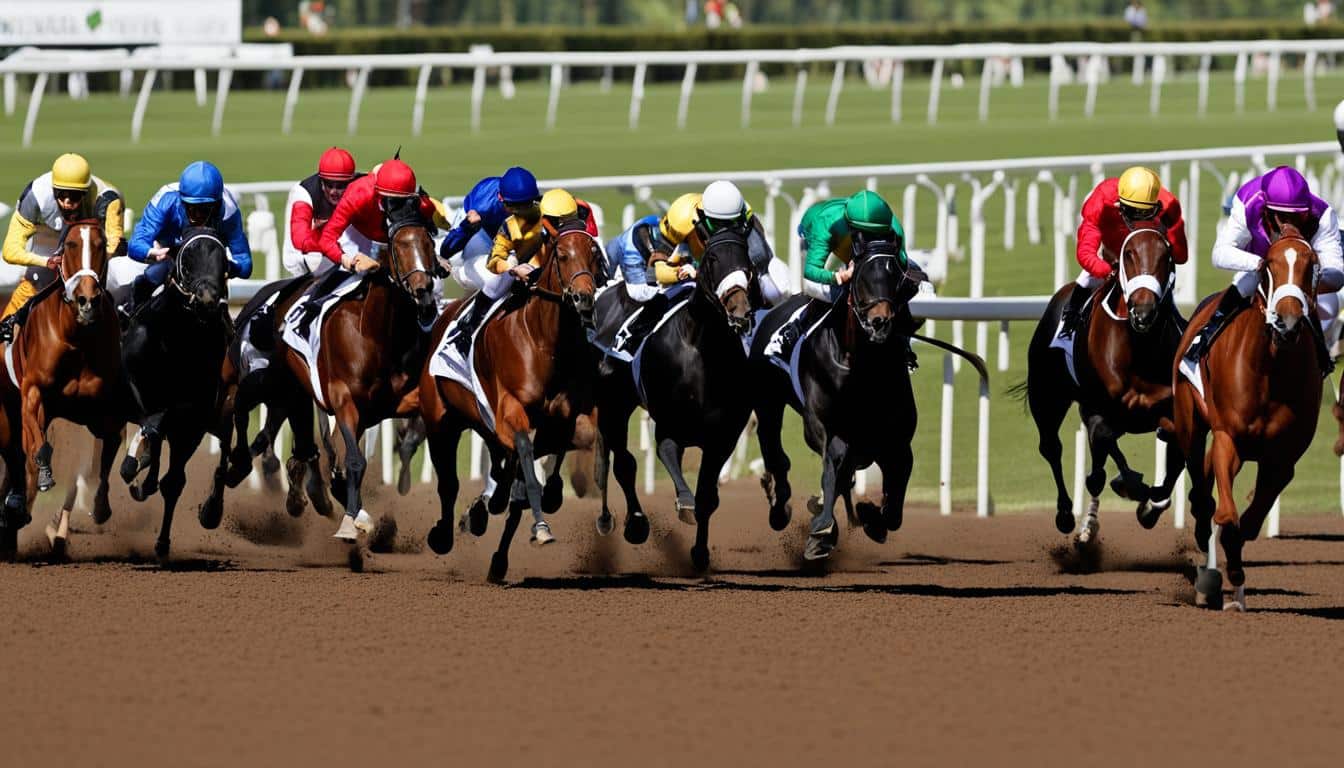Welcome to our comprehensive guide to mastering horse betting arbitrage strategies. If you’re looking to maximize your returns at the track, then you’ve come to the right place. In this section, we’ll introduce you to the concept of horse betting arbitrage and provide you with some effective horse betting strategies to help you succeed.
Horse betting arbitrage is all about taking advantage of discrepancies in the odds offered by different bookmakers to guarantee a profit. By understanding how to compare odds, calculate stakes, and execute successful arbitrage bets, you can increase your chances of profitability. However, it’s important to note that arbitrage betting is not foolproof, and there are risks involved. That’s why it’s essential to have a solid strategy in place.
Throughout this guide, we’ll explore various horse betting strategies that can help you fine-tune your approach and increase your chances of success. Additionally, we’ll provide you with valuable insights into analyzing horse racing betting systems and staying ahead of the game with horse racing tips.
So, get ready to unleash your inner horse betting expert and discover how to master horse betting arbitrage strategies like a pro.
Understanding Horse Racing Arbitrage
Arbitrage betting is a powerful way to generate consistent profits when simply betting on a winner isn’t enough. In the context of horse racing, it involves comparing odds from various bookmakers and placing bets on outcomes that guarantee a profit, regardless of the final result. To execute successful horse racing arbitrage, it’s important to have a solid understanding of the intricacies involved in this process.
Firstly, when identifying potential horse racing arbitrage opportunities, it’s essential to compare odds from different bookmakers. This requires extensive research to find discrepancies in prices. You need to ensure that the difference in odds is significant enough to make a profit, and factor in any commissions charged by the betting exchanges or bookmakers.
Secondly, calculating the necessary stakes is critical when placing successful horse racing arbitrage bets. This involves determining the amount of money to bet on each outcome, taking into account the odds, commission, and profit margins. Proper calculation and allocation of stakes can significantly increase your chances of winning.
Lastly, executing horse racing arbitrage bets requires discipline and patience. Unlike traditional bets, arbitrage bets often involve placing bets on different outcomes to ensure profit, which takes patience and attention to detail. Timing is also important, so act promptly when you spot an opportunity.
To maximize your profits from horse racing arbitrage, it’s also crucial to implement effective horse racing betting strategies. Placing single bets or using each-way bets can help mitigate the risk and increase your potential returns. Additionally, analyzing past performance statistics, factoring in track conditions, and evaluating jockey and trainer form can provide valuable insights when placing arbitrage bets.
When done correctly, horse racing arbitrage can be a highly profitable strategy for betting enthusiasts. By understanding how to identify opportunities, calculating necessary stakes, and executing bets with discipline, you can unlock incredible returns with this approach.
Analyzing Horse Racing Betting Systems
When it comes to horse betting, having a solid betting system can be a game-changer. In this section, we will explore three popular horse racing betting systems and evaluate their advantages and disadvantages.
The Form Analysis System
The Form Analysis System is based on analyzing the recent form of horses to determine their likelihood of winning. This system involves assessing factors such as recent performance, track preferences, and distance aptitude.
| Advantages | Disadvantages |
|---|---|
| Can help identify horses in good form | Doesn’t account for external variables such as track conditions or jockey form |
| Uses readily available information | Requires a lot of research to properly analyze |
While the Form Analysis System can be useful for identifying strong contenders, it should be utilized in conjunction with other systems in order to account for external factors.
The Speed Ratings System
The Speed Ratings System ranks horses on their past performances, based on their average speed figures for each race. This system involves comparing horses’ speed ratings to determine their relative speed and predicting which horse will run the race fastest.
| Advantages | Disadvantages |
|---|---|
| Considers a horse’s recent form over different distances | Can be heavily influenced by past results, potentially overlooking recent developments in a horse’s form |
| Provides an objective ranking system | Doesn’t account for jockey or trainer form |
The Speed Ratings System can be effective when combined with other systems, but it should not be solely relied upon.
The Trainer/Jockey Statistics System
The Trainer/Jockey Statistics System involves analyzing the performance statistics of the trainer and jockey, taking into account factors such as winning percentages, strike rates, and track records. This system uses these statistics to identify horses that are likely to perform well under certain conditions.
| Advantages | Disadvantages |
|---|---|
| Considers the influence of trainers and jockeys on horses’ performance | Depends on how well a trainer or jockey knows their horse |
| Provides a detailed understanding of each horse’s strengths and weaknesses | Relies heavily on past performance |
The Trainer/Jockey Statistics System can be a powerful tool when used in combination with other systems. However, it requires a considerable amount of research and analysis to be truly effective.

By understanding the strengths and weaknesses of these horse racing betting systems, you can build a comprehensive betting strategy that accounts for a variety of factors and maximizes your chances of success. However, it’s important to remember that no betting system is foolproof, and the most successful bettors are those who continuously refine and adapt their betting strategy based on the latest information.
Maximizing Returns with Sports Betting Arbitrage
While horse racing offers numerous arbitrage opportunities, sports betting arbitrage is equally profitable. To succeed in sports betting arbitrage, you must identify inconsistencies in the odds across different bookmakers. Once you find a value bet, you can place wagers on both sides of the market to guarantee a profit, regardless of the outcome.
However, this strategy requires careful planning and execution. To get started, consider the following key factors:
- Sports knowledge: The more you know about the chosen sport, the easier it will be to spot discrepancies in the odds offered. Focus on a few specific sports initially before expanding your portfolio.
- Bookmaker accounts: To compare odds effectively, you’ll need accounts with multiple bookmakers. Consider signing up with at least three to five bookmakers.
- Speed and timing: Arbitrage opportunities usually exist only for a short period, so you’ll need to act quickly. Use software to identify opportunities and place bets instantly.
Once you have identified a value bet, you can execute a successful arbitrage strategy by placing bets strategically. Some popular betting strategies include:
- Full cover bets: Wagering on all possible outcomes of a market to guarantee a profit.
- Reverse bets: Placing a bigger stake on the underdog with higher odds to maximize profits.
- Free bets: Utilizing free bets offered by bookmakers to boost overall profits.
To further illustrate the concept of sports betting arbitrage, refer to the table below, which showcases potential arbitrage opportunities in a football match:

Remember, sports betting arbitrage requires patience, skill, and discipline. Always be aware of risks and bet responsibly.
Staying Ahead of the Game with Horse Betting Tips
When it comes to horse racing betting, staying informed is key. The following horse betting tips will help you make informed decisions and improve your chances of profitability:
Analyze Racecards
The first step to successful horse betting is analyzing racecards. Racecards provide essential information about the horses, jockeys, and trainers participating in a race. By studying the racecards, you can identify the horses that are most likely to win, place, or show, and place your bets accordingly. Keep an eye out for factors like recent form, track conditions, and distance, as these can all have a significant impact on a horse’s performance.
Study Horse and Jockey Form
Another important factor to consider when horse betting is horse and jockey form. A horse’s recent performances, as well as the jockey’s reputation, can give you an idea of how well they are likely to perform in an upcoming race. Research horses and jockeys before placing your bets to gain a better understanding of their strengths and weaknesses.
Interpret Track Conditions
The track conditions can also have a significant impact on the outcome of a horse race. Some horses perform better on certain types of tracks than others, so it’s important to interpret the track conditions correctly when placing your bets. Keep an eye out for factors like the firmness of the ground, the weather, and the time of day, as these can all affect a horse’s performance.
Factor in Other Relevant Variables
Finally, it’s important to factor in other relevant variables when making your horse betting decisions. For example, the odds offered by different bookmakers can vary significantly, so it’s important to shop around before placing your bets. Additionally, you should consider your betting budget, the size of the field, and any other relevant factors that may impact the outcome of the race.
| Horse Betting Tips | |
|---|---|
| 1. Analyze racecards | Finding the best contenders for each race |
| 2. Study horse and jockey form | Understanding the strengths and weaknesses of each team |
| 3. Interpret track conditions | Adjusting your strategy based on changing track conditions |
| 4. Factor in other relevant variables | Shopping around for the best odds and considering your budget |
By applying these horse betting tips and incorporating them into your overall betting strategy, you can stay ahead of the game and increase your chances of profitability. Remember to always stay informed and adaptable, as horse racing is a constantly evolving sport.
Conclusion
Mastering the art of horse betting arbitrage requires patience, keen observation, and a deep understanding of the horse racing world. By following the techniques outlined in this article, you can gain a competitive edge and maximize your returns.
Remember, effective horse betting strategies are not limited to arbitrage. By analyzing form, studying horse and jockey statistics, and keeping an eye on track conditions, you can make informed betting decisions that increase your chances of profitability.
Continuous learning and adaptation are key to success in horse racing betting. Stay up to date with the latest news and insights in the industry and continue to refine your approach. With determination and perseverance, you can become a skilled horse betting arbitrageur and achieve long-term profitability.
Thank you for reading this article, we hope the information provided on horse betting arbitrage, horse betting strategies, and horse racing betting has been valuable to you. Good luck at the track!












